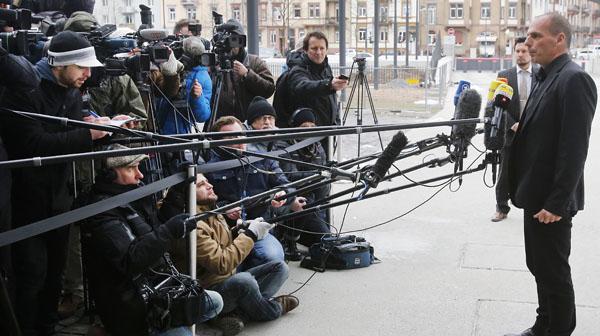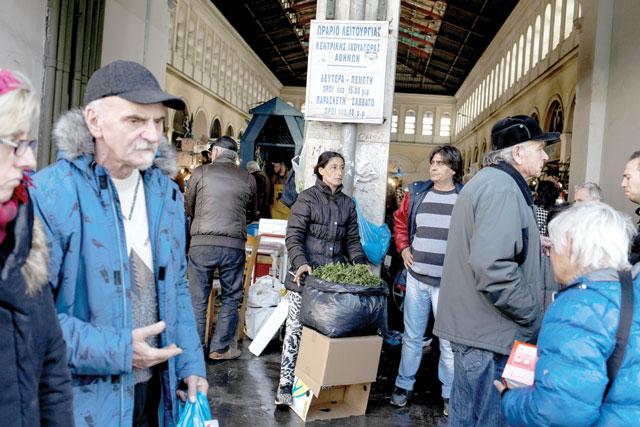You are here
ECB, Eurogroup give Greece breathing space after Athens vote
By AFP - Jul 17,2015 - Last updated at Jul 17,2015

A bank employee distributes tags with queue positions to pensioners as they wait outside the main gate of the national bank of Greece to withdraw a maximum of 120 euros ($134) in central Athens on Thursday (AP photo)
FRANKFURT () — Eurozone ministers approved the launch of Greece bailout talks and the European Central Bank (ECB) boosted its cash lifeline to the crisis-hit country Thursday after lawmakers in Athens grudgingly passed a tough reform package demanded by creditors.
"The Eurogroup welcomes the adoption by the Greek Parliament of all the commitments specified in the Euro Summit statement" reached in marathon talks last weekend, the eurozone's 19 finance ministers said, just hours after the Greek parliament passed sweeping changes to taxes, pensions and labour rules.
In an almost immediate reward to Athens, ECB Chief Mario Draghi in Frankfurt said that a vital cash lifeline to Greece's struggling banks would be boosted, while also throwing his weight behind IMF calls for debt relief to the country.
The Emergency Liquidity Assistance or ELA — which has kept Greek banks, and by extension the Greek economy, afloat — has been fixed at around 89 billion euros ($99 billion) since late June, but would be topped up with an additional 900 million euros, Draghi said.
The news propelled European stock markets which closed higher on Thursday.
Greek Prime Minister Alexis Tsipras on Wednesday had to face down a major mutiny in his radical left Syriza party, and violent protests in the streets of Athens, to win parliamentary approval for the draconian reforms demanded in the bailout package.
But the Eurogroup, led by the no-nonsense Dutch Finance Minister Jeroen Dijsselbloem, was encouraged by the outcome.
The Greek authorities "have implemented the first set of four measures in a timely and overall satisfactory manner", it said in a statement.
'Important step'
The European Commission, the EU's executive and Greek creditor, also approved Greece's delivery of key reform demands.
"The Greek parliament took an important step toward rebuilding trust with Greece's international partners," said commission spokeswoman Annika Breidthardt.
The Eurogroup statement did not mention whether ministers had discussed a three-month 7.0 billion euro bridging loan for Greece through an EU-wide crisis fund to hold Athens over until its new bailout is ratified.
Non-euro Britain and the Czech Republic have resisted the use of this fund, but European officials told AFP that a compromise was in the works and could be finalised on Friday.
In Frankfurt, the ECB played its part by boosting the ELA facility which, strictly speaking, it is only available for banks that are solvent — a questionable assumption in Greece.
But Draghi said, with the bailout talks now moving forward, the conditions were "in place" to raise the ELA ceiling.
Athens has failed to make a key debt repayment to the International Monetary Fund, and its next debt deadline is a 4.2-billion-euro payment to the ECB itself on July 20.
But Draghi was adamant that Athens would repay its debts to both the ECB and the IMF, declaring confidently that "on 20 July, we will be repaid".
Draghi insisted that the capital controls introduced by Athens had protected savers, even if they may have put a temporary drag on recovery.
The ECB chief conceded that doubts remain about the "willingness and capacity" of the Greek government to push through the economic reforms demanded by its creditors.
'Debt relief needed'
Draghi also said that Greece — whose debts amount to 180 per cent of economic output — would need some sort of debt relief.
The key was what form such relief could take, he said.
The IMF, one of Greece's creditors alongside the EU and the ECB, caused a stir with a bombshell report criticising the deal and warning that lenders would have to go "far beyond" existing estimates for debt relief.
But for the biggest creditor, Germany — whose parliament must vote on resuming talks on the new bailout package — a pure and simple writeoff is seen as a no-go.
"A real debt haircut is irreconcilable with membership in a monetary union," hardline Finance Minister Wolfgang Schaeuble insisted on Deutschlandfunk public radio.
In Athens, many of Syriza's hardline leftists Wednesday voted against the measures, including former finance minister Yanis Varoufakis, after a tempestuous debate.
And even the new finance chief Euclid Tsakalotos said his decision to back the bailout terms "will burden me my whole life".
Several other eurozone parliaments are now due to vote on the bailout package.
France gave its green light on Wednesday, and Finland's parliament on Thursday gave its approval for the bridge financing plan and for talks on a third bailout deal for Greece.
On Friday, German lawmakers will interrupt their summer holiday to vote on granting the government a mandate to negotiate the modalities of the new aid package.
Related Articles
ATHENS — Greek Prime Minister Alexis Tsipras announced his resignation and called for snap elections on Thursday, as he went on the offensiv
Greece's new leftist government appealed to the European Central Bank (ECB) on Wednesday to keep its banks afloat as it seeks to negotiate debt relief with its eurozone partners, but Germany rejected any rollback of agreed austerity policies.
BRUSSELS — Greece on Monday agreed to compromise on new bailout reforms in a bid to break a deadlock with its EU- International Monetary Fun


















